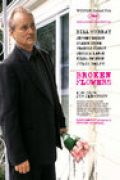
Directed by
Jim Jarmusch
106 minutes
Rated M
Reviewed by
Bernard Hemingway

Broken Flowers
Synopsis: Just as Don Johnston (Bill Murray) has been dumped by his latest lover, Sherry (Julie Delpy) he receives by mail a letter from an anonymous former lover informing him that he has a 19-year-old son who may now be looking for his father. Don embarks on a cross-country trek in search of clues from four former flames.Since his first film Permanent Vacation (1980) Jim Jarmusch has established a career as an independent auteur in American film by sticking close to a particular demographic. If not as thematically circumscribed as those of Woody Allen (and, mercifully, nowhere as consistently churned out), Jarmusch's films are aimed squarely at a now-middle-aged cosmopolitan audience with a taste for coffee, cigarettes and sardonic black humour - probably people pretty much like himself. If you are one such and especially if you like Jarmusch's style, then you will probably enjoy this film. Indeed, the film won the Grand Prix at this year's Cannes International Film Festival, from which one can conclude that the judging panel were of Jarmusch's demographic (the film was an US/French co-production) and/or that the competition wasn't too strong.
My problem with Jarmusch is that his films do not offer a lot more than their style, even if that is likeable enough in its modesty. Subject-wise his films vary, but in essence they are all the same - deadpan tales of the picaresque adventures of bespoke hipster dudes, enigmatic and phlegmatic, couched in an episodic narrative form and served up with a pared-back, blues-based soundtrack. Only with Ghost Dog (1999) has the director ever truly broken out of this formula, at least with his fiction films. Broken Flowers sticks well within it and the best one can say that it is a good example of the paradigm. In the central role Bill Murray, in characteristic phlegmatic form, is an apt choice for the Jarmusch (anti-)hero. This character is, typically, one profoundly alienated and thereby both melancholic and detachedly observational, a person who passively experiences life in self-styled existentialist resignation.
Jarmusch, who wrote the script, thus sets up his story to get Murray on the road and adventuring. This involves a laborious set-up in which Murray's character is (improbably) established as a Don Juan with relationships apparently so numerous that he cannot recall with whom he might have fathered a child some 20 years previously and a neighbour with 3 jobs and 5 children but apparently enough spare time to track down the available candidates and deliver to Murray an itinerary complete with flight, hire car and accommodation bookings. One third of the film is spent on this but still, one hopes, knowing the high calibre of actresses Jarmusch has assembled, that the sparks will fly once Don engages with his old flames. This proves to be a misconception as the engagements unfold with characteristic (for both Jarmusch and Murray) laconism. In short order he beds then-and-now good-time girl, Sharon Stone (this is after having been walked out on by Julie Delpy, what, one is inclined to ask does this guy have?), has a boring dinner with the near-catatonic Dora (Frances Conroy), gets the brush-off from the apparently lesbian Carmen (Jessica Lange, sad to say, looking like she's had too much cosmetic surgery), and an even stronger rebuttal from Penny (Tilda Swinton, amusingly, in Dixie chick-on-the-farm mode). None of these encounters do more than establish that Don Johnston was not particularly nice to these women in the past, something of which he seems already well aware, and, as we saw at the outset, to which he is apparently comfortably resigned (for some reason he only shows any warmth to his black neighbour's wife).
Whilst Broken Flowers, with its Left Bank-inflected philosophical "cool" attitude (the film is dedicated to Nouvelle Vague director Jean Eustache) is a balm in contrast to the usual free-enterprise-and-love-conquers-all hokum that we are accustomed to from Hollywood, particularly given its potential, this is too wanting in wit or dramatic force to lift it beyond its stylistic charms.

Want more about this film?


Want something different?




